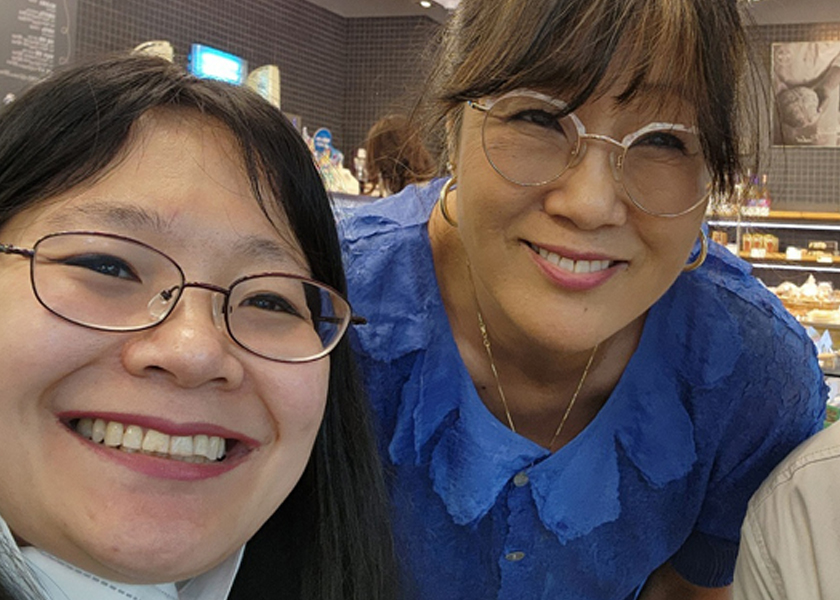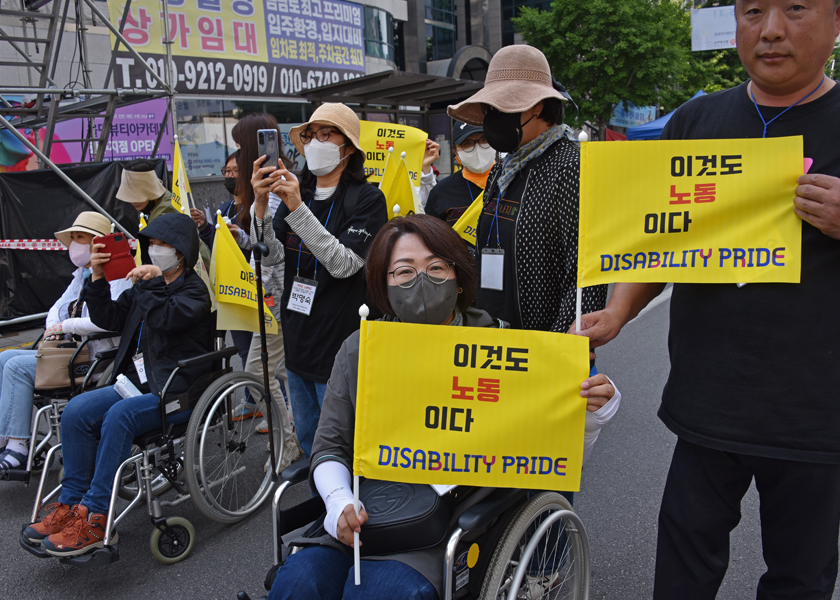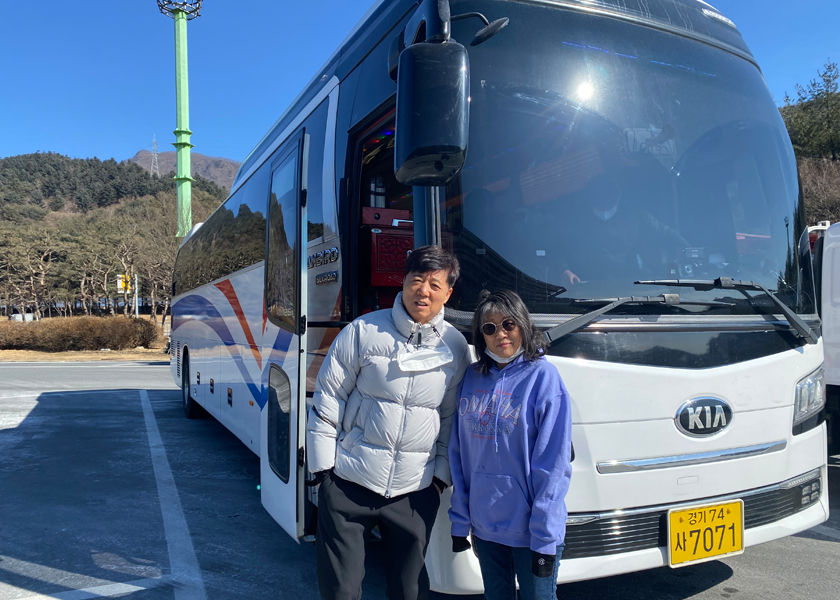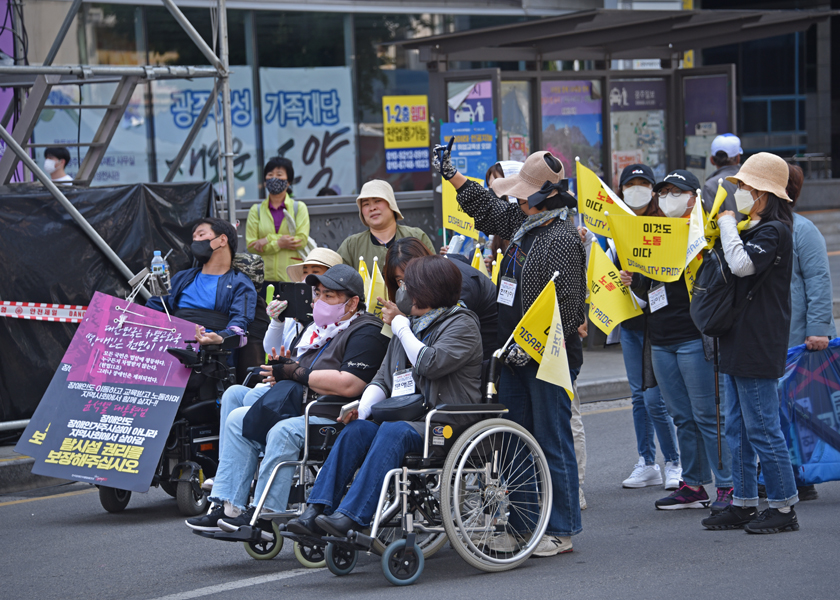Creative travel agent offers custom Korea trip where mobility will not be an issue | By Martha Vickery (Summer 2022)

A travel agency that has been offering tours to Korean adoptees living in Korea will expand in fall 2022 and spring 2023 to include two expertly-planned tours of Korea for Korean adoptees everywhere who are mobility-impaired.
The tours are 100-percent wheelchair-accessible, according to Barbara Kim, a California Korean adoptee who is based part-time in Seoul, and is working with the sponsoring travel agency for the tours.
Although there are many different types of Korea tours for Korean adoptees, this one is special because it is the first that has been designed especially for Korean adoptees with mobility issues. The knowledge and creativity to set up this tour came from travel agent and Korea native Jed Kim, advised by Megan Green (Korean name Ji-yeong Noh) a Korean American adoptee who lives in Seoul and uses a wheelchair, and Barbara Kim, who has been working with the travel agency, Smart Travel, for about 18 months.
The $3,500 price tag includes: Airfare between Seattle (Washington) and Seoul; 10 days of meals, hotels, luxury buses and other transportation for sightseeing, English-speaking tour guides, performances, scheduled cultural demonstrations and other activities targeted to interest Korean adoptees. It is a very low price for this type of tour, according to Kim.
Two tours for mobility-challenged adoptees will be offered: September 11-21; and September 25-October 5. The September 11-21 tour will be accompanied by a second tour group of adoptees, adoptive parents, friends and families. The September 25-October 5 tour will be accompanied by a tour group of adoptees and their significant others.
Barbara said she has known Jed Kim for many years through work with Korean young adults, including adoptees, living in Korea. He started by helping a special group of young adults, known as “aged-out” orphans. These are adults who grew up in orphanages and are at the point of being on their own. At a vulnerable point in their lives, many need help with logistical life issues, such as looking for jobs and apartments, and setting up bank accounts. Jed has worked in various helping roles with these young adults, and has also helped adoptees who are living in Korea with the similar challenges.
The two September trips will be conducted concurrently with two other trips for (non-mobility-challenged) Korean adoptees, so that two groups can travel together. “If we go to, say, a temple, and there are steps, we will just find something alternative for [the mobility-challenged group] to do,” Kim said. “During down time, or when we are eating, we will all be together,” she said. The idea is that a bigger group will just be better and more fun.

The tour is happening at a key time for disabled travelers. Recently, the rights of disabled people in Korean public spaces is getting increased attention, in part due to activism and outreach by organizations of people who use mobility devices, along with their supporters.
Barbara Kim currently uses a cane or crutches, after several recent corrective surgeries on one leg, and has had many experiences with mobility-challenged travel in Korea. Her friend and fellow tour consultant Megan Green uses a wheelchair for all her travel.
Over the years that Barbara has traveled back and forth from Korea, she has observed that accessibility for those with mobility issues has improved, but she still sees many inadequacies in the public landscape.
South Korea is still “not totally set up for handicapped-accessible travel,” Barbara noted. Although the subway system is the most accessible of all the public transportation systems, there is still a lot to improve. In subways, she said, there are elevators, but some are on the opposite side of a huge underground station from the subway line you want to use. “Then when you get to the surface, sometimes sidewalks are made from brick or tile,” which can be a hazardous surface for wheelchairs, she explained.
“The engineering in Korea perplexes me, because sometimes there are elevators that open and then you come down a ramp, and there may be corners that are too sharp and wheelchairs may be tipping over, or the ramps are too narrow, or the inclines are too steep,” she said.
Her friend Megan has commented that when scheduling a trip, she mentally doubles the time a schedule or phone app will indicate it takes to get there, because of the likelihood of running into such issues.
Subways can be a bit scary for wheelchair users, because there is a gap between the train car and the edge of the platform, which should be very narrow, but in fact, may vary in width, Barbara noted. Wheelchairs can occasionally get stuck in a gap as doors close. Due to lack of awareness of disabled people’s needs, subway riders in a crowded car may not make the effort to make space for wheelchairs, or may be unwilling to yield the seats marked with a symbol for disabled to the mobility-challenged passengers, Barbara said.
The group is using Megan’s long experience with mobility issues in Korea to set up the tours for an optimum experience for mobility-challenged participants. Megan and Barbara have been scoping out sites and transportation routes for the tour.

Barbara said she got involved with the Smart Travel agency at first because owner Jed (Hyeong-seob Kim) was offering two- or three-night tours for independent young adults who had spent their childhood in orphanages and were newly on their own. The tours were timed for the major holidays of Chuseok and Lunar New Year. He and Barbara met because she was also interested in working with that group.
Barbara said Jed thought of special holiday tours because both Chuseok and Lunar New Year are family times, and orphans usually do not have families with whom to spend holidays. Jed began by offering the tours at a reduced price. More recently, Love Beyond the Orphanage, a non-profit aid organization in Eugene, Oregon, which assists “aged-out” orphans with independent living, has been paying the cost of these tours so that young adults can participate for free.
Barbara explained that Jed is also “very aware of how time-consuming it is to do birth searches.” With tour participant permission, Jed will make arrangements with media to publicize birth search stories during the September tours.
“He has a kind of double purpose in this,” Barbara added. “He also wants people in Korea to know that mobility-challenged people can live a normal life.” If media shows images of people using mobility devices accessing hotels and restaurants and having fun at famous tourist sites, it will reinforce a positive image of people with disabilities in Korea.
For more information, travel details and a proposed itinerary of either the tour for mobility-challenged Korean adoptees or the parallel tours, contact Barbara Kim: Bjbkim1662@gmail.com
Smart Travel will also offer an April 2023 women’s tour for “first-wave” (i.e. age 49 and older) Korean adoptee women, with more information available closer to the date. Contact person for that tour is Kim Hanson: skethan90@yahoo.com



